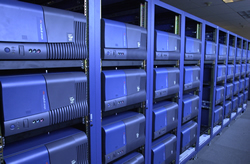OSC Summer Camps offer skills, credit and fond memories

The Ohio Supercomputer Center's K-12 summer education programs — Summer Academy, Young Women's Summer Institute (YWSI) and Summer Institute (SI) — are now accepting applications for 2008.
Summer Academy in Computational Science and Engineering
New in 2008, the Summer Academy in Computational Science and Engineering is for high school students and teachers interested in learning how to use modeling and simulation in engineering design.

 COLUMBUS, Ohio and MOUNTAIN VIEW, Calif. - OSC (Ohio Supercomputer Center) and SGI (NYSE: SGI) announce the launch of a new cluster from SGI utilizing the Itanium-based Silicon Graphics® 750 system, making this cluster one of the fastest in the world.
COLUMBUS, Ohio and MOUNTAIN VIEW, Calif. - OSC (Ohio Supercomputer Center) and SGI (NYSE: SGI) announce the launch of a new cluster from SGI utilizing the Itanium-based Silicon Graphics® 750 system, making this cluster one of the fastest in the world.